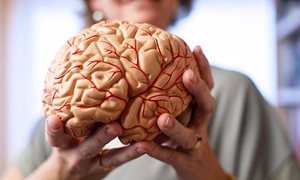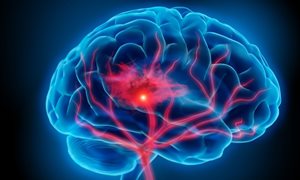
The brain function of patients with Parkinson's disease improves with regular exercise. Exercise strengthens connections between different brain areas and it inhibits brain shrinkage. Control over movements also improved in patients who cycled on an exercise bike for 45 minutes three times a week for six months.
In Parkinson's disease, dopamine-producing cells in the brain die. As a result, patients experience a variety of symptoms, ranging from slower movement to shaking of an arm or leg. A 2018 study showed that symptoms stabilized in patients who exercised intensively on an exercise bike three times a week compared to a control group that only performed stretching exercises. MRI scans were also taken of both groups of participants, the results of which have now been published in Annals of Neurology.
Stronger brain networks
Many individuals with Parkinson’s disease develop difficulty with automatic movements such as walking. This is because the part of the brain that controls these routines is affected. The researchers noticed on MRI scans that in physically active patients, brain networks were stronger between parts that had been relatively spared by Parkinson’s disease. "These parts of the brain are given a stronger role in the whole brain network. We see this as a compensation strategy of the brain: it compensates for the fact that automatic movements, such as walking, become more difficult," said Rick Helmich, neurologist and principal investigator of Radboud university medical center and Donders Institute.
Grey-matter volume in the brain stabilizes
The researchers also looked at the brain's grey-matter volume, where the cell bodies of nerve cells are located. This clearly showed that grey-matter volume remained stable over time in patients who were active on the exercise bike for six months. In the group that did stretching exercises, grey-matter volume decreased over time. Helmich: "These findings are in line with previous studies that have shown that people who exercise actively develop more connections between brain cells. This means that you train not only your muscles, but also your brain, when you exercise."
Better ability to control movements
Finally, the patients who were physically active also became better at controlling movements. Martin Johansson, PhD student and first author of the publication, explains how they were able to determine this: "We asked the participants to perform various cognitive tasks, using eye movements to measure how well patients could exercise control over automatic movements. It turned out that the physically active group performed better at this than the control group: they improved their own performance from six months earlier, while the control group did not change. On MRI scans we then saw that their performance was directly related to their fitness, measured by their lung capacity. That showed: the fitter, the greater the control over automatic movements."
Exercise is good for the brain
The researchers suspect that intense exercise improves brain function by stimulating compensatory capacity, not by slowing down Parkinson's disease. Rick Helmich: "We know that sports are good for the brain. For everyone, but certainly also for people with Parkinson's disease. These results have important implications: exercise causes changes in the brain that can reduce Parkinson's symptoms. I hope that people with Parkinson's take this as a huge motivation to exercise more. In this time of frequent lockdowns, it also emphasizes the importance of exercise and sports."
About the publication in Annals of Neurology
Aerobic exercise alters brain function and structure in Parkinson's disease a randomized controlled trial - ME Johansson, IGM Cameron, NM van der Kolk, M De Vries, E Klimars, I Toni, BR Bloem, RC Helmich. DOI: 10.1002/ana.26291.
-
Want to know more about these subjects? Click on the buttons below for more news.
More information
Pauline Dekhuijzen

wetenschaps- en persvoorlichter
Related news items

NWO Stevin Prize for expert on Parkinson’s disease Bas Bloem Major scientific prize for societal impact on research into Parkinson's disease
17 June 2022 Neurologist Bas Bloem of Radboudumc receives this year’s Stevin Prize of the Dutch Research Council (NWO). The Stevin Award is the highest distinction in science for a researcher in the Netherlands who has achieved particular success in the area of knowledge utilization for society. read more
Erno Hermans appointed professor of Cognitive Affective Neuroscience
13 April 2022Hermans unravels the effects of stress on the brain, and uses that knowledge to develop preventive training programs that increase resilience.
read more
Tiny blood vessels, big problems Radboudumc receives grant for international collaboration
3 November 2021 The Radboudumc, together with the University of Cambridge, receives a grant of €1.8M from three collaborating cardiac foundations for international research into the small blood vessels in the brain. This study will be led by Neurologist Frank-Erik de Leeuw and internist Niels Riksen. read more
People with Parkinson’s disease can benefit from seven gait strategies
9 September 2021 People with Parkinson’s disease who have difficulty walking can use several strategies to improve walking. New research shows that many people have never heard of or tried these strategies. read more
Treatment of brain diseases at risk if neuroscientists can no longer conduct their research
5 August 2021 In order to treat brain diseases such as depression, Alzheimer's or ADHD, more research into the brain is needed. read more
